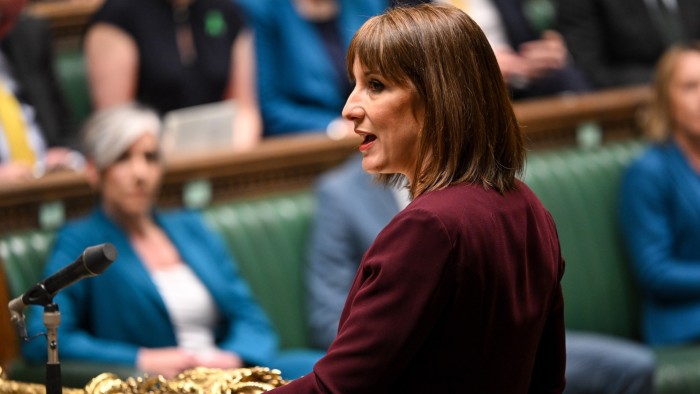Unlock the Editor’s Digest for free
Roula Khalaf, Editor of the FT, selects her favourite stories in this weekly newsletter.
Rachel Reeves’ “tiny” room for manoeuvre on public finances was thrown into stark relief on Thursday after Donald Trump announced 25 per cent tariffs on foreign-made cars, with warnings it made the prospect of tax rises later in the year more likely.
Within hours of the UK chancellor announcing her Spring Statement, the prospect of an escalating trade war posed a new threat to the £9.9bn of headroom she had given herself against the many risks facing the economy.
Richard Hughes, head of the independent Office for Budget Responsibility, warned that a full-blown global trade war could eliminate that headroom, while some economists said the chancellor could be forced to raise taxes in her autumn Budget.
“This represents the crystallisation of one of the risks that we highlighted around our central forecast,” Hughes said on Thursday.
Reeves said she hoped the US president could be persuaded to exempt Britain from the tariffs before they were introduced on April 2, saying: “We are in intense negotiations with our US counterparts on cars, steel and every other type of tariff.”
Sir Keir Starmer, prime minister, indicated that Britain would not immediately retaliate. “I’m very clear in my mind that the sector, the industry, does not want a trade war,” he said.
Business secretary Jonathan Reynolds told an international trade conference at the Chatham House think-tank that the UK had not “wanted any tariffs applied” during negotiations with the US.
But Reynolds also gave clear hints that the UK could water down its digital services tax (DST), which raises £800mn a year largely from US tech giants, to secure a tariffs deal with Washington.
“It’s not as though DST was put in place as if it can never change or we would never have a conversation about it,” he said.
The OBR’s Hughes said that, in a worst-case scenario where the US levied additional 20 percentage point tariffs across the world and the UK retaliated, “we would lose about 1 per cent of GDP at its peak”.
He said that would weigh heavily on growth next year — which the OBR has forecast will hit 1.9 per cent — and would lower growth in the medium term by 0.75 per cent.
“That kind of shock would be enough to wipe out the £10bn of headroom Rachel Reeves has set aside.”
Hughes warned that the chancellor’s headroom was “a tiny fraction of the array of risks and shocks that could hit the UK economy in the next five years”.
He said that on top of tariffs there were risks to the UK’s domestic productivity outlook, a warning to Reeves that the OBR might re-evaluate its consistently optimistic assessment of Britain’s growth potential.
“There’s a lot of uncertainty about recent figures and what they mean for UK growth and output for workers,” he said. “If growth were just 0.1 per cent less per year over the next five years, that would be enough to wipe out that headroom.”
Many economists think Reeves could be forced to raise taxes this year to put the public finances on a more stable footing — even after Wednesday’s welfare and other spending cuts.
Paul Johnson, head of the Institute for Fiscal Studies, said Reeves’ headroom was “tiny”, adding: “There is a good chance that economic and fiscal forecasts will deteriorate significantly between now and the autumn Budget.
“If so, she will need to come back for more, which will probably mean raising taxes even further.”
The US is the second-largest export destination for UK-made cars, accounting for 17 per cent of the industry’s exports after the EU, which accounts for 54 per cent, according to the Society of Motor Manufacturers and Traders.
Car exports were worth £6.4bn, according to the Office for National Statistics. While the UK exported £60.4bn of goods to the US in 2023, it sold services of £126.3bn in the same year, according to the most recent figures available from the ONS.
UK luxury car brands such as Jaguar Land Rover, Aston Martin and Bentley would be hit hard by the tariffs since they do not produce any cars in the US.
Ian Henry, an automotive production expert who runs the AutoAnalysis consultancy, said some luxury brands such as Rolls-Royce and Bentley might have more flexibility to absorb the higher tariffs by cutting margins at dealers or by trying to reduce the cost when vehicles arrive in the US.
“For UK car exporters, this is a very challenging development,” said Tomasz Wieladek, economist at T Rowe Price. “Some of the very high-end producers might be able to pass the cost of tariffs on to consumers, because their customers are price-insensitive. For all other UK automakers, this policy will severely restrict market access.”
Downing Street played down the prospect of the UK’s retaliating by targeting Elon Musk’s Tesla, the US electric vehicle maker. “We’re not singling out individual companies,” a spokesman for Starmer said.
Read the full article here

